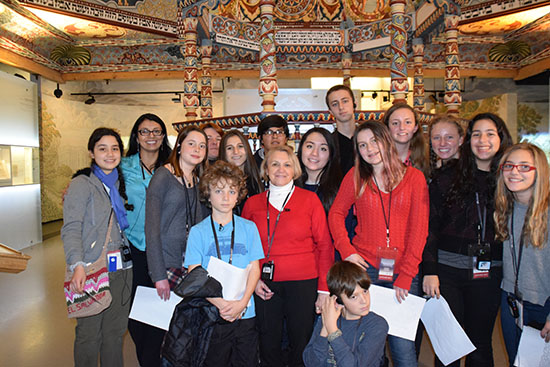"Past is Present" in Action: Lesly Culp

This year-long series will catch up with teachers and staff who participated in the Auschwitz: The Past is Present professional development program led by USC Shoah Foundation and Discovery Education to commemorate the 70th anniversary of the liberation of Auschwitz. The program brought 25 teachers from around the world to Warsaw and Krakow from Jan. 23-28, 2015, where they toured museums and historical sites, learned how to incorporate testimony into their teaching, and attended the official commemoration at Auschwitz-Birkenau State Museum. In “Past is Present” in Action, the participants reflect on the program and share how it has influenced their work.

(Lesly Culp, second from left, with Paula Lebovics, center, and the Junior Interns at the Museum of the History of Polish Jews)
Auschwitz: The Past is Present was a once-in-a-lifetime experience for not just the teachers and students who attended, but the USC Shoah Foundation staff who led the program as well.
Lesly Culp, senior education specialist and trainer, helped plan and implement the trip to Poland for the teachers and Junior Interns. Leading up to and during the trip, the USC Shoah Foundation education staff worked long hours in order to ensure the program was successful and smooth, and Culp said she believes they accomplished this goal.
Culp worked especially closely with the Junior Interns, who began preparing for the trip to Poland in October with weekend IWitness workshops and assignments. While in Poland, they helped the teachers brainstorm new testimony-based classroom lessons, visited and reflected on museums and historical sites and thought about what they can do to fight intolerance and the conditions that lead to genocide. Culp said she was impressed by the interns' ability to absorb the difficult history of the Holocaust and form a real connection to survivor Paula Lebovics, who accompanied them on the trip and whose testimony they watched before they left.
She knew that they were troubled by the facts they were learning about the Holocaust, and observed how their questions deepened throughout the trip – “Why did this happen? Why didn’t anyone stop it?” But through Paula’s testimony and meeting her in person, the Junior Interns were able to connect a human face and voice to what they were learning. They were especially fascinated by a story Paula told them about her life before the war, when she would sing at the top of her lungs to get her family’s attention at the kitchen table.
“I worried about the horrific facts they were gathering, I worried that it would be the only thing they would hold on to, but they didn’t, instead they think about those moments of happiness Paula shared, which are not all that different from their own moments,” Culp said. “This makes their comprehension profound and puts them on the road to positive change within themselves.”
Culp said many of the Junior Interns have expressed a serious desire to share IWitness and the Visual History Archive in their schools, through clubs and other activities. They are still processing their emotions and everything they saw and did in Poland, but are proving to be extremely conscientious and passionate about their Past is Present experience.
Culp said their visits to the Museum of the History of Polish Jews in Warsaw and the Auschwitz-Birkenau State Museum made a deep impression on her. It was her first visit to Auschwitz, and though she learned a lot, the visit brought up even more questions of how and why such atrocities could be allowed to occur.
She was also struck by the way MHPJ showcased not only the dark times in Jewish history but also the peaceful, beautiful times. The contrast between the two made the Holocaust even more stark and appalling, she said.
“I thought about how there’s such a focus of those dark years in too many classrooms, and as profound as that knowledge can be, ignoring the elaborate history is such a de-service to the memory of what was,” Culp said.
In the aftermath of the trip, Culp can see how the experience has propelled the participants into action. The Junior Interns and teachers are sharing their experiences in their schools and communities and thinking of innovative ways to integrate testimony into their learning environments. They are also helping Culp and the education staff organize one-day ITeach seminars and other professional development programs for educators in their area.
Like this article? Get our e-newsletter.
Be the first to learn about new articles and personal stories like the one you've just read.